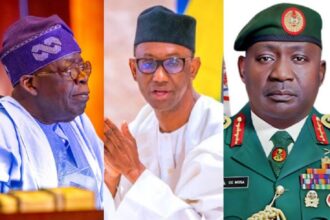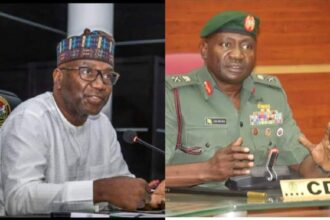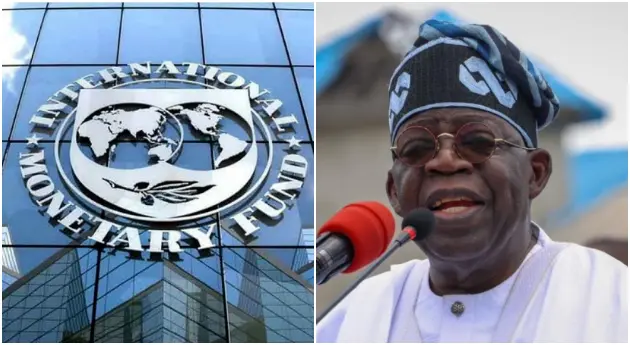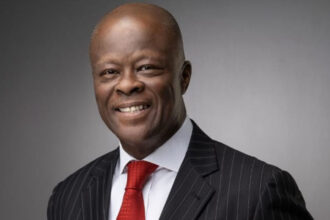EMIR of Kano, Sanusi Lamido Sanusi is one of those Nigerians categorised as a Hailer. These are those who are said to have actively supported the aspirations of President Muhammadu Buhari and his All Progressives Congress (APC). Those who are critical or seen to be opposed to him are called Wailers. And so, when a wailer takes a critical look at Buhari’s government giving a verdict that the performance is less than average then it is time to sit up. And that was how Lamido stirred the hornets’ nest at the Kaduna Investment Summit last week. A man known or pulling no punches when commenting on issues about friends or foe, criticized both northern and national establishments over the way they have managed issues concerning the economy and religion. Sanusi found a way to weave religious manipulations in the north into pervasive poverty within the region. He also took a dep swipe at the management of state and national economies particularly with a newfound penchant for debt accumulation as a way out of underdevelopment.
It is no longer news that by May 29, 2015 when President Muhammadu Buhari took over the reign of Nigeria’s leadership, the economy was already in shambles as the preceding administration had already declared austerity by the beginning of the year and was borrowing heavily to pay workers’ salaries. What is news however, is that since he took over on May 29, 2015, life has become much harder for the average Nigerian. The economy itself appears dangerously rudderless with both fiscal and monetary authorities groping over how to prevent the ship of state from finally hitting the rock and scattering.
From 8.2 percent in July 2015, unemployment rose to 13.9 exactly one year later. Figures for the fourth quarter of the year was still being awaited when this piece was being written. Likewise, inflation rate, which was at 9.2 percent in July 2015 rose to 18.72 percent in January 2017 before moderating slightly to 17.78 in February.
According to statistics from National Bureau of Statistics (NBS), Nigeria failed to record any foreign direct investment (FDI) in the third quarter of 2016. The office noted that value of foreign currency imported into the country declined to $1,822.12 million or $1.822 billion during the same period.
In the light of this, government has resorted to heavy domestic and foreign borrowing to augment budget shortfalls. In his keynote address to the summit titled “Promoting Investment in the Midst of Economic Challenges” Sanusi warned on continued dependence on debt to run government.
Sanusi dismissed much of the growth experienced since around 2005 as a fluke as they were based only on rising in commodity prices and debt. “What happened was that after the Paris Club and London Club negotiations after the Highly Indebted Poor Countries (HIPC) programmes, African economies found themselves de-leveraged and then it quietly went on a borrowing binge. Borrowing domestically to fund recurrent expenditure and that was true of Nigeria as it was true of many other commodity producing African countries.
“As a country, we need to understand that the growth of Nigeria in the period of high growth was driven largely by rising commodity prices and debt. And that model has now reached the logical limits. The collapse in oil price has made that very obvious. Today, if you are looking at debts; if you take the IMF Article IV Consultation report, the Federal Government of Nigeria is spending sixty-six percent of its revenue on interest on debt. Which means only 34 percent of revenue is available for only capital expenditure, for recurrent expenditure and for development. That model cannot work.”
It is on record that following the payment of the about $15 billion between 2005 and 2007, total external debts of the Federation were reduced to $3.54 billion owed only to multilateral agencies. By December 2015 however, external debt has climbed back to $10.71 billion with Federal Government accounting for $7.348 while states and FCT were owing $3.369 billion. By the same date, Federal Government owed local creditors N8.84 trillion while states owed N1.65 trillion. By September 2016, the Debt Management Office (DMO), said total sovereign debts had risen to over N16 trillion. Again when Director General of DMO, Abraham Nwankwo briefed a House Committee in March this year, the debt portfolio had risen to over N17 trillion.
Even now, President Buhari is requesting for permission to borrow a further $30 billion from the National Assembly between now and 2019. With deteriorating domestic currency, there are fears that this could easily escalate as exchange rate worsens.
Of the total, $25.8 billion is for Federal Government while states will jointly utilize $4.1 billion. Federal Government’s portion would be used to build the much awaited over 3,000 megawatts Mambilla Hydro project, which will gulp $4.8 billion. The Chinese contractors have already opened office in Abuja with a promise to deliver the project located in Taraba State in January 2021.
Calabar- Port Harcourt- Onne Railway Modernisation $3.5 billion; Abuja Mass Rail Transit Phase 2- $1.6 billion; Lagos-Ibadan double track railway- $1.3 billion; Kano-Kaduna double railway track- $1.1 billion; Others (unspecified) $6 billion. $3.5 billion would be deployed to Budget Support; $2.1 billion on Education and Health; $0.9 billion on Agriculture and $0.2 billion on Economic Management and Statistics.
States will spend $0.1 billion on Education and Health; $0.3 billion on Agriculture and $0.2 billion on Economic Management and Statistics.
Although debts are classified into reproductive and dead-weight. Debt is reproductive when it is used to purchase capital projects like electricity, road construction, and other infrastructure. But debt undertaken to finance current expenditures are dead-weight debts.
But for Sanusi, “as a country at the national level, and as state governments at the sub-national level, we need to understand that the model of government borrowing and spending has reached its limit. Growing can only come from investment. It cannot come from consumption, it cannot come from government balance sheet, it cannot come from borrowing, because you cannot borrow unsustainably because everybody from Federal to state government has to ask one question: how do I make Nigeria, how do I make my state, how do I make my local government or my emirate the attractive destination for the scarce capital flying around the world. I honestly do not think that there is yet mindset change either at the national or sub-national level and the way to see it is to look at the budget.
“If you are still borrowing money to finance infrastructure, then you are still in that mindset of borrow and spend. We have governors who go to China, spend one month on a tour of China and only come back with MoUs for debts.
China will lend you$1.8 billion to build light rail. The rail would come from China, the train would come from China, the engines comes from China, the labour comes from China, driver is Chinese. At the end of the day, what do you benefit from it? You ride on a train and when you ride on a train in a state like Kano, where are you going to? You are not going to an industrial estate to work, you are not going to school, you are not going to the farm. You borrow money from China to invest in trains so that your citizens can ride on a train to go for weddings and naming ceremonies. There is no economy. And if you don’t have an economy, why do you want a train?”
Shockingly, Sanusi pointed at what has not been highlighted in the proposed 2017 budget still under scrutiny by the National Assembly saying “If you look at the 2017 budget of the Federal Government, the amount earmarked for debt service is in excess of the entire non-oil revenue. But that is not the problem. The problem is that it is a budget that goes for even more debts! So if you are paying 66 percent of your revenue as interest and you add more debts, when do you stop?”
And truly, Nigeria’s obsession with deficits and public debts in recent times have started to create fiscal imbalances. Economic analysts are canvassing that current public debts will create burden for future generations; and is fast crowding out private sector credit.
Both capital and money market analysis show a current tendency to disruptive movements in interest rates and exchange rates.
Although DMO continues to insist that the country’s huge debt remains sustainable, there are fears that drastic reduction in the price and quantity of crude oil being sold by Nigeria might have affected this projection. It is being argued that Nigeria’s debt position no longer satisfies the solvency condition without a major correction in the primary balances given the cost of financing.
The traditional ruler also looked at economic situation in the north and lambasted entrenched leadership interests. There was much laughter when he commenced his speech citing his long standing relationship with Kaduna State Governor, Nasir el-Rufai. Then he
Says he: “People keep asking me how come you are always friends with this el-Rufai? And I say I need him because he is the only person in the public space that makes me look like a moderate. Usually, people go to my friends and say: Talk to your friend; he is too radical. But what I find is people coming to me to say: talk to your friend Nasiru. Ans as long as I continue to have that, I am convinced that I am not the most radical or the most extreme pubic officer. So I have to keep close to Governor Nasiru.”
However, by the time he delved into population, polygamy, girl-child education, interpretation of the Quran, poverty and development issues in the north, most of the dignitaries in the hall were no longer smiling.
Sanusi warned governments in the north to rather spend resources “on education, we need to invest in health care. We are in denial. The north west and the north east demographically constitute the bulk of Nigeria’s population but look at human development indices, look at the number of children out of school, look at adult literacy, look at maternal morbidity, look at infant mortality, look at girl-child education completion rate, look at par capital income. The north east and the north west of Nigeria are among the poorest parts of the world, not just the poorest parts of Nigeria. As far back as year 2000, I looked at the UN Human Development Indices for Borno and Yobe states and discovered that if these two were a country, on their own were poorer than Niger and Cameroon and Chad.”
He particularly reserved some harsh words for current and past governments of Kano State for exhibiting retrogressive tendencies.
“Let me remind everyone that I publicly opposed that opposition to the movie industry because as an economist, I know that building Kannywood is among the major strategies that would have led to the growth of the economy of Kano. We already had a comparative advantage. An industry that would have created jobs, we already have a youthful population that is being imaginative, that is producing good movie ideas that are popular, that is producing actors and actresses, costume designers, photographers, and that entire industry is now being moved to Kaduna.
“About 10 years ago in Kano, a state governor who was a university graduate, who was a teacher organised a public event at which books written by northern Nigerian authors were burnt.
“What is the crime of those books? They were about something called soyeya and love apparently is supposed to be a very bad word in a society where you don’t love your woman and you don’t love your children, where you beat up your women, why should anybody talk about love? Because we have adopted an interpretation of our culture and our religion that is rooted in the 13th century mindset, that refuses to recognise that the rest of the Muslim world has moved on!
Today in Malaysia, it is ok for you to wake up and divorce your wife but you must give her 50 per cent of the wealth that you acquired since you married her. It’s a Muslim country! In Nigeria you wake up one day after marrying your wife for 20 years and say I divorce you.
“Islam is not univocal: there are many voices, there are many interpretations; there are many viewpoints and we have for too long allowed the most conservative viewpoints to be in ascendancy and consequences of that are certain social problems.”
Although he did not exactly complete his thought on this but Sanusi also made veiled reference to the vexed issue of constant farmers/herdsmen clashes in the north and all over the country.
There is a Bill presently before the National Assembly seeking to create a grazing pathway across the country. On this path, no farer will be allowed to farm. But Sanusi said “In 1960, land per rural dweller in Nigeria was 2.0 hectares. Today, it is 0.9 hectares. In a decade, it will be 0.5 hectares. Some of this has been environmental, desertification, desalination. Some of it has been huge demographic explosion and we do not want to address it”.
Sanusi’s speech was not all gloom though as he admitted that the foreign exchange market was already seeing some convergence in the multiple exchange rate, which prevailed recently.
“We have a lot of good news coming out of Nigeria because we can see the IMF Article IV Consultation is not as negative as it would have been in the light of certain recent developments but the environment remains challenging: money supply growth, inflation rate of almost 20 percent, multiple exchange rates which are now beginning to see some convergence.”
Following conclusion of its Article IV Consultation in February, IMF had recommended that central bank should intensify bank monitoring, adopt stronger prudential guidelines as well as ensure that something was done about undercapitalised banks; remove all forex restrictions and unify exchange rates to be followed by tighter monetary policy to anchor inflation expectations. And for government to embark on ambitious structural reform which is key to achieving a competitive, investment-driven economy that is less dependent on oil; increase value added tax rate as a way of shoring up non-oil revenue; administer an independent fuel price-setting mechanism to eliminate fuel subsidies; and develop a well-targeted social safety net.
In the end, he advised “growth is not going to come from rising oil prices, growth will not come from borrowing and spending government money, growth would come from investments. We should recognise that investors are both local and foreign. Aliko Dangote has invested more in Nigeria than any foreign investor and there are many other local investors. We therefore need to create an environment in which we attract and encourage domestic capitalist to invest, because it keeps the money in Nigeria, it provides great long term security, we can link them up with foreign partners who would like to exit later after bringing in the technology and the skills,








